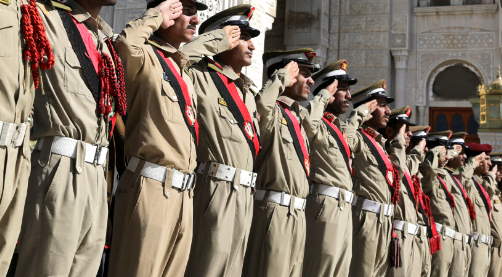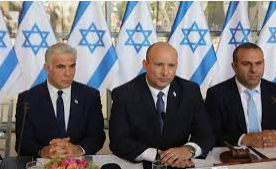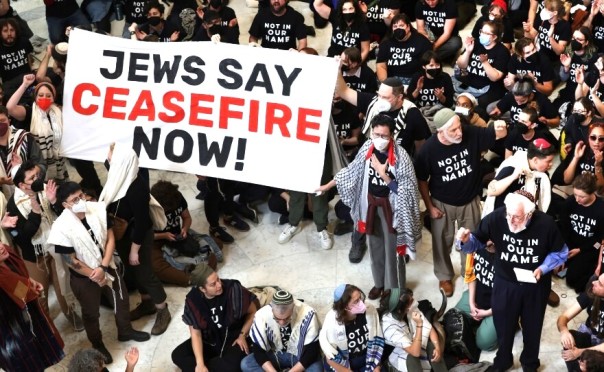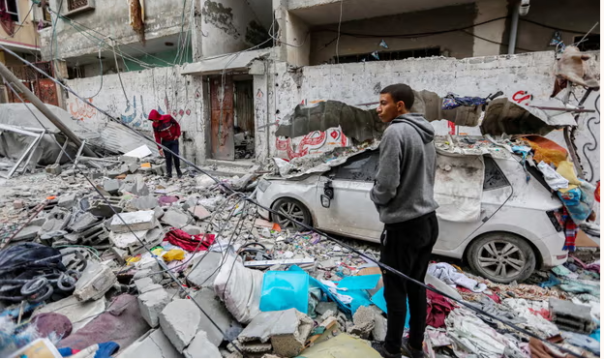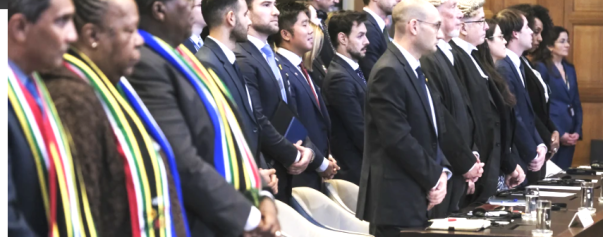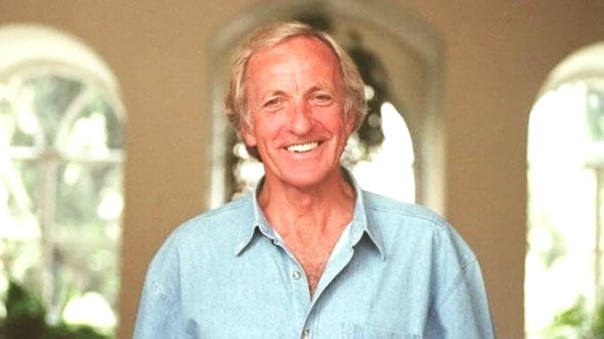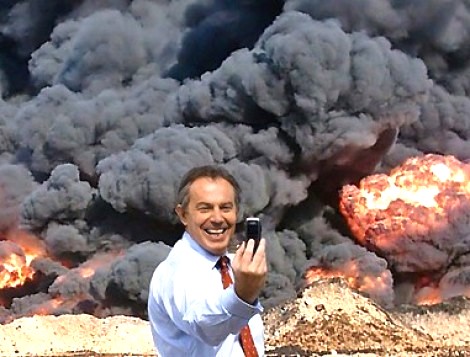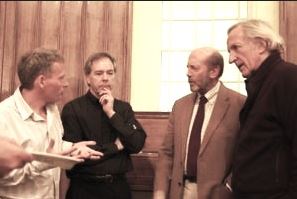A lone voice in a recent radio phone-in asked “Why don’t UN peacekeepers stand between Hamas and the IDF?”
In 2015, after stabbing incidents injuring Palestinians and Israelis, hundreds of Palestinians were protesting along the northern Gaza border. France 24 reported that the unrest began three weeks earlier as Palestinians barricaded themselves inside the Al-Aqsa mosque, hurling rocks and firebombs at the police. It was fuelled by allegations that Israel plans to change the arrangement at the Old City hilltop compound, holy to Jews and Muslims.
In Britain a petition was presented to government: for deployment of UN Peacekeepers on the Gaza-Israel Bordef (UK, 2015).
Two of several clauses:
We demand our government to call upon the United Nations to immediately deploy Peacekeeping forces and negotiate a truce between the two sides to end the humanitarian crisis.
We demand that the siege upon Gaza be lifted so that the Gazan population may live a dignified life as set out in the Universal Declaration of Human Rights.
In October 2023, Bloomberg reported proposals for temporary governance of the strip under a United Nations umbrella but commented that this solution is unlikely to be accepted as the State of Israel had been antagonised by more than 45 resolutions condemning its Palestinian actions by the United Nations Human Rights Council.
The UN Peace-keeping or Peace Support Operations (UKPSO), whose role is described in an undated United Nations Association report, has for many years been undertrained and underfunded.
These and other ‘challenges’ are described in a Security Nexus report, published by the Daniel K. Inouye Asia-Pacific Center for Security Studies, a US Department of Defense Institute (above). Challenges include:
- Western countries’ drastically reduced troop numbers to United Nations missions since 1988 and stepped up their NATO military missions to pursue national interests.
- Because the United Nations does not have a standing army or police force of its own, it cannot send the military and police forces of member states and to field missions in a short period of time.
- There is a need to update the pre-deployment training of military contingents, utilizing lessons learned from previous missions to ensure that weapons and equipment of the countries serving in the PSOs are not obsolete and that personnel are mentally and physically prepared for operational areas and weather conditions
- Legal frameworks and documents providing oversight for PSO participation, rights, duties, and responsibilities need to be improved.
“The majority of UN Peacekeeping missions succeed in their primary goal, ultimately stabilizing societies and ending war”(Howard).
Failures on the part of UN Peacekeeping missions have been highly publicised, but Professor Lise Howard of Georgetown University, in Washington D.C. redressed the balance in her recent book Power in Peacekeeping, based on extensive field research across different UN peacekeeping missions:
“If we look at the completed missions since the end of the Cold War, two thirds of the time, peacekeepers have been successful at implementing their mandates and departing,” Professor Howard said in an interview with UN Video.
“Peacekeepers reduce the likelihood that civil wars will recur. They also help to achieve peace agreements. Where there’s a promise of peacekeepers, we are more likely to see a peace agreement and peace agreements that stick.”
Above all, she stresses, UN peacekeepers have saved millions of lives since the creation of peacekeeping in 1948. 12 of the most successful operation are listed here.
–
(Ed) Challenges faced by UNPSO should be addressed, enabling it to become an effective peacekeeping force.
o
o
o
o
Professor Johan Galtung
 Diana Schumacher recently sent news of the death of Johan Galtung (1930 – 2024) who was the main founder of the Peace Research Institute Oslo (PRIO) in 1959 and served as its first director until 1970. He also established the Journal of Peace Research in 1964 (For more information about his life and work use this link: Johan Galtung).
Diana Schumacher recently sent news of the death of Johan Galtung (1930 – 2024) who was the main founder of the Peace Research Institute Oslo (PRIO) in 1959 and served as its first director until 1970. He also established the Journal of Peace Research in 1964 (For more information about his life and work use this link: Johan Galtung).
The Security Studies Network minutes noted the following members’ references in the 1990s.
- In 1982, Johan Galtung published Environment, Development and Military Activity: Towards an Alternative Security Doctrine, which was cited on this website.
- Sponsorship of colleague to attend a 1999 meeting at the Institute for Policy Research & Development, based in London, which included on its advisory board Dr.Johan Galtung
- Eirwen Harbottle recommendation that SSN further the work done on sub-regional security at the request of Shridath Ramphal, Commonwealth Secretary and that earlier links with Johan Galtung be renewed. BP: 28.4.99
One of SSN four pillars, in memory of Brigadier Michael Harbottle, was defensive defence. “Transarmament” was used by Professor Johan Galtung—as a technical term to describe this shift in military strategy. He distinguished between offensive and defence armaments and suggested transitioning to a defensive system of national defence, advocating precise weapons with limited range and destructive effects. See his 1984 article: “Transarmament: From offensive to defensive defence”, Journal of Peace Research. 21 (2): 127–139.
In 2002 SSN commissioned A Non-offensive Defence Stance for the UK: an introductory study on the Implications of the UK adopting a Non-Offensive Defence Stance, by Dr Steven Schofield, which was launched in a house of Commons committee room, hosted by former defence minister, MP Peter Kilfoyle. In 2004 Eirwen recalled: “The series of wars between Ecuador and Peru over an uninhabited small border territory ended when the Norwegian peace researcher Johan Galtung proposed to make the disputed territory a national zone, jointly administered by both governments, with a natural park and peace monument to attract tourists and bring more income to both countries. He pointed out that this cost only $250 for a meal with the incoming president and a night in a hotel, whereas the first Gulf war cost $100 billion, not counting the destruction it caused, and the lives lost”.
In 2004 Eirwen recalled: “The series of wars between Ecuador and Peru over an uninhabited small border territory ended when the Norwegian peace researcher Johan Galtung proposed to make the disputed territory a national zone, jointly administered by both governments, with a natural park and peace monument to attract tourists and bring more income to both countries. He pointed out that this cost only $250 for a meal with the incoming president and a night in a hotel, whereas the first Gulf war cost $100 billion, not counting the destruction it caused, and the lives lost”.
Johan Galtung was director of Transcend and co-founder of the organization in 1993 and Alice Gavin comments that his successful role in this 1990s conflict illustrated the potential of the Transcend method.
 A forthcoming post on the Non-Lethal Defence site will focus on the work of Ioannis (Yannis) Stivachtis (right), who cited the work of Galtung and other contributors in this 2003 paper:
A forthcoming post on the Non-Lethal Defence site will focus on the work of Ioannis (Yannis) Stivachtis (right), who cited the work of Galtung and other contributors in this 2003 paper:
“One factor contributing to arms races is the aforementioned security dilemma, that if a country acquires weapons to increase its own security, it decreases the security of potential opponents . . . In contrast, non-offensive defence is designed to break out of that dilemma. If a country adopts a purely (or primarily) defensive military posture that increases its own security without threatening the security of others, it can unilaterally find a way out of an arms race caused by mutual fear”.
 In a Stirrer article (2008, closed website) there was a reference to the late Nicholas Gillett, who used to train teachers in the West Midlands and warned that a lack of local roots needs to be addressed by schools if anomie and alienation are to be avoided: “Johan Galtung rates this danger as being as serious a threat as nuclear war . . . every school needs one or two teachers who had grown up in the locality and so have something very important to share with the children. Already schools are using grandparents’ memories to make social history seem more real”.
In a Stirrer article (2008, closed website) there was a reference to the late Nicholas Gillett, who used to train teachers in the West Midlands and warned that a lack of local roots needs to be addressed by schools if anomie and alienation are to be avoided: “Johan Galtung rates this danger as being as serious a threat as nuclear war . . . every school needs one or two teachers who had grown up in the locality and so have something very important to share with the children. Already schools are using grandparents’ memories to make social history seem more real”.
After reading Ted Dunn’s book, A STEP BY STEP APPROACH TO WORLD PEACE : REGION BY REGION, Galtung wrote to him saying “I think regionalization of the world’s problems is the only feasible way”.
The last reference found was in a 2020 post, Profile: Alfred Fried, PJ pioneer, by Peter van den Dungen:
 “In the era of fake news, peace journalism has become even more vital. News media habitually emphasises conflict over peaceful resolutions, differing viewpoints over common ground, and sensationalism over depth and context using frames and a language that conform to has been labelled “war journalism” by peace scholar Johan Galtung. Audiences are given the impression that conflict is inevitable, and that peace or conflict resolution are beyond reach (Clint Witchells)”.
“In the era of fake news, peace journalism has become even more vital. News media habitually emphasises conflict over peaceful resolutions, differing viewpoints over common ground, and sensationalism over depth and context using frames and a language that conform to has been labelled “war journalism” by peace scholar Johan Galtung. Audiences are given the impression that conflict is inevitable, and that peace or conflict resolution are beyond reach (Clint Witchells)”.
o
o
o
o
Is there a way out of the Israeli-Palestinian trap? Both sides are right to fear destruction, but change is not impossible Professor Yuval Noah Harari*
This five page article is summarised here but people are urged to read it in full. If prevented by the paywall ask for a link in the comments section.
Professor Harari (below right) opens: “Israeli-Palestinian conflict is fuelled by the mutual horror of destruction. Each side fears the other wishes to kill or expel it, and terminate its existence as a national collective. Unfortunately, these are not irrational fears born out of paranoia, but reasonable fears based on recent historical memories and a relatively sound analysis of the other side’s intentions”.
The Palestinian fear of being killed or displaced
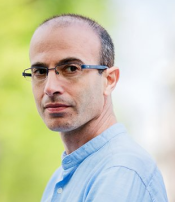 Palestinians experienced decades of massacres and expulsions at the hands of Israelis and other regional powers – two examples are given. In addition to such historical memories, each and every Palestinian in the occupied territories knows that any day they could be killed, imprisoned or driven from their land by Israeli settlers or security forces.
Palestinians experienced decades of massacres and expulsions at the hands of Israelis and other regional powers – two examples are given. In addition to such historical memories, each and every Palestinian in the occupied territories knows that any day they could be killed, imprisoned or driven from their land by Israeli settlers or security forces.
Harari quotes several calls for the utter destruction of the Gaza Strip by Israeli politicians adding that it is not unreasonable to believe that Israel would have attempted to drive the Palestinian population of the Gaza Strip into the Sinai desert but for Egyptian resistance and international pressure.
The Israeli fear of being killed or displaced
Jews arrived on the banks of the Nile and Euphrates at least 1,000 years before the Arabs conquered Egypt and Iraq in the 7th century CE. But after 1948 these communities were totally wiped out. There are virtually none left in any Arab country, other than the 2,000 Jews of Morocco and the 1,000 of Tunisia.
The founding event of modern Jewish and Israeli identity is the Holocaust. Then in 1948, the Palestinians and their Arab allies made a concerted effort to annihilate the new-born state of Israel and kill or expel all its Jewish inhabitants (Ed: during the second half of the 1948 Palestine war) and at least half of Israeli Jews are the descendants of these Middle Eastern refugees.
Each and every Israeli knows that they personally might be murdered or abducted any day by Palestinian or Islamist terrorists, whether in their homes or while travelling anywhere in the world.
When Israelis analyse the intentions of Palestinians, they conclude that if they are ever given the chance, Palestinians will probably kill or expel the 7mn Jews currently living between the Jordan River and Mediterranean Sea.
The current war has confirmed Israelis’ deepest fears, demonstrating that an alliance of powerful regional forces that back it, including Hizbollah, the Houthis and Iran, poses an existential threat to Israel.
Iranian and Hezbollah commanders help to direct Houthi attacks in Yemen | Reuters
What happened to Jewish villages such as Be’eri and Kfar Aza and to Nova music festival attendees on October 7 fed Israeli fears of extermination.
Israelis and Palestinians both have good reasons to believe that the other side wishes to kill or expel all of them. For both sides the way to remove the existential threats seems to be to get rid of the other side.
Is there a way out of this trap?
A peaceful solution to the conflict is technically feasible. There is enough land between the Jordan and Mediterranean to build houses, schools, roads and hospitals for everyone.
But it can be realised only if each side can honestly say that, even if it had unlimited power and zero restrictions, it would not wish to expel the other: “No matter what injustices they committed against us and what threats they still pose, we nevertheless respect their right to live dignified lives in their country of birth.”
Such a profound change in intentions is bound to manifest itself in action, and eventually ease the fear and hatred, creating space for genuine peace.
There are already numerous individuals on both sides who wish well for the other (examples here), including close to 2mn Arab citizens of Israel, usually referred to as either Arab Israelis or Palestinian Israelis.
Members of Israel’s Arab Ra’am Party
When Hamas launched its attack, it hoped these Palestinian-Israelis would rise up against their Jewish neighbours. In fact, on the day of the massacre, numerous Arab citizens rushed to help their Jewish neighbours. Some were even murdered by Hamas for doing so.
Every day since, despite hostility from many Jews, including government ministers, Arab-Israelis have continued to serve in Israeli institutions from hospitals to government offices. The two most prominent Palestinian-Israeli politicians roundly condemned the massacre and called on all sides to lay down their arms and seek peace.
Harari reflects that we have little control over the intentions of others, but we should be able to change our own minds. Even readers who are neither Israeli nor Palestinian can decide whether they wish both sides, or whether they cherish the hope that one of these groups will simply disappear from the face of the Earth.
oOOo
*Prof. Yuval Noah Harari: Historian, philosopher and the author of the bestsellers “Sapiens: A Brief History of Humankind”, “Homo Deus: A Brief History of Tomorrow”, and “21 Lessons for the 21st Century”. Co-Founder of Sapienship, a multidisciplinary organization advocating for global responsibility whose mission is to clarify the public conversation, support the quest for solutions and focus attention on the most important challenges facing the world today (technological disruption, ecological collapse and the nuclear threat). 2002, PhD, University of Oxford. Lecturer, Department of History, Hebrew University of Jerusalem. His website: https://www.ynharari.com/
COMMENT
A reader from the Netherlands writes:
‘Both side-ism’ (“Both sides are right to fear destruction”) is a commonly used means to claim false balance (see the stats here from UN: https://www.ochaopt.org/data/casualties ) … nothing could be further from the truth … one is the oppressor, one is oppressed. This makes it a clear case in international law (“complex” is rarely used in other cases!). It’s also not about religion etc, but abuse of such for – again – fossil fuels:
Ed: I agree that for the last 7 decades the Palestinian people have been oppressed in many, many ways and I take every opportunity to tell people so – it’s surprising how many do not know.
I hadn’t heard a whisper of the gas issue. https://priceofoil.org/2009/06/18/the-great-gazan-gas-robbery/ and found https://en.globes.co.il/en/article-shell-relinquishes-gaza-gas-field-rights-1001226973 and https://www.reuters.com/business/energy/partners-israels-tamar-gas-field-agree-further-expand-production-2024-02-18/
OF COURSE I too want sustainable peace; basis for that is honest assessment of situation and geopolitics at play ..
I sent the summary round because it seemed to me that it was an honest assessment of situation and geopolitics at play but I now see that in omitting any reference to the hardships endured by the Palestinian people it is not.
o
o
o
o
Rabbis from Britain’s Liberal Judaism and Reform Judaism call for an immediate ceasefire in Gaza
US members of the Jewish Voice for Peace and the If Not Now movement, who have staged rallies from October onwards to call for a cease-fire in the Israel–Hamas war.
An online search revealed frequent coverage of rallies in the United States in the foreign press including the Times of Israel, but only one substantial UK account of those leading US protests against Israel’s action in Gaza (The Independent).
Today the writer found a well-hidden letter in the Guardian, written on the 27th February by seven members of synagogues in different parts of the country, about Jewish opposition to ‘Israel’s vastly disproportionate onslaught against Gaza’.
They hope that UK political leaders will at last begin to realise that there are large numbers of British Jews who are deeply unhappy about the action and urge the UK government, for the sake of Palestinians, Israel and the hostages, to act to end the bloodshed in Gaza, pointing out that 39 rabbis from two major Jewish denominations (Liberal and Reform) have called for an end to the bloodshed in Gaza.
People inspect damage and recover items from their homes following Israeli air strikes in Gaza city on Tuesday
An extract:
The UK rabbis are quite right to highlight the dreadful toll of “tens of thousands” of Palestinian deaths, and the plight of many more who have suffered life-changing injuries and trauma. They are right to draw the world’s attention to those Gazans who still “lie buried under the rubble of destruction”. And they quite rightly warn that any Israeli ground offensive against Rafah “will have a devastating impact on vulnerable and traumatised civilians”.
This follows a statement from the senior rabbi of another UK Jewish denomination, Masorti, who warned two weeks ago of the “unimaginable suffering” that would be caused by an attack on Rafah. It is “impossible to remain silent”, he said.
Nearly 3,000 British Jews (including the CEOs of both Liberal and Reform Judaism – and 60 UK rabbis) have now signed a statement of principles stating that “Israel must take care to protect innocent civilians”; that it can “never be acceptable … to deny civilians their basic human needs”; and that the laws of war “place clear limits on what harm can be done to civilians”.
For justice’s sake, for the Palestinians’ sake, for Israel’s sake, for the hostages’ sake, and for humanity’s sake, the UK government must now call for an immediate ceasefire.
Continued death and destruction will only create further suffering, further hatred and further wars. We call on all UK Jews, and especially those in Liberal Jewish congregations, to join us in calling for an immediate ceasefire and the resumption of realistic humanitarian aid.
oOOo–
On Political Concern tomorrow: over 200 legislators from 13 countries unite to oppose their countries’ arms exports to Israelo
o
o
o
o
Obituary: Fredrik S. Heffermehl (1938-2023)
 Fredrik S. Heffermehl was a Norwegian peace activist and lawyer who waged a long campaign against the Norwegian Nobel Committee for not respecting the will of Alfred Nobel
Fredrik S. Heffermehl was a Norwegian peace activist and lawyer who waged a long campaign against the Norwegian Nobel Committee for not respecting the will of Alfred Nobel
A growing unease that the persons Alfred Nobel had in mind as deserving winners of his peace prize were losing out and that the Norwegian Nobel Committee’s decisions were often failing to respect Nobel’s intentions (as expressed in his will), led Norwegian lawyer and peace activist Fredrik S. Heffermehl to start a campaign to oblige the Committee to bring its awards more in line with the requirements of the will.
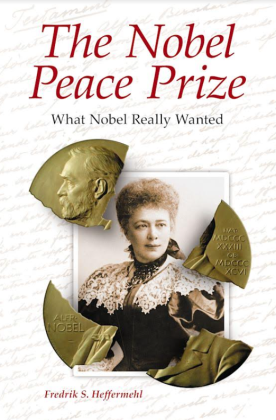 With considerable justification he argued that successive Committees had never undertaken a legal analysis of it (as regards the prize for peace) or considered the circumstances which had given rise to the prize. (right, 2010 publication)
With considerable justification he argued that successive Committees had never undertaken a legal analysis of it (as regards the prize for peace) or considered the circumstances which had given rise to the prize. (right, 2010 publication)
Heffermehl, who has died at his home near Oslo on 21 December only weeks after celebrating his 85th birthday and launching his latest book The Real Nobel Peace Prize on 11th November, was a leading member of the Norwegian peace movement, of the International Association of Lawyers against Nuclear Arms (IALANA), and one-time vice-president of the International Peace Bureau (1910 Nobel laureate).
–
The full obituary, by Dr Peter van den Dungen, Lecturer/Visiting Lecturer in Peace Studies, University of Bradford, UK; Visiting Fellow, Norwegian Nobel Institute (2000); Author of several publications on the Nobel peace prize, may be read here.
o
o
Principled leadership*: the Welsh Parliament voted for a Hamas-Israel ceasefire and many in Wales have – for four months – demonstrated for peace
First published on Political Concern
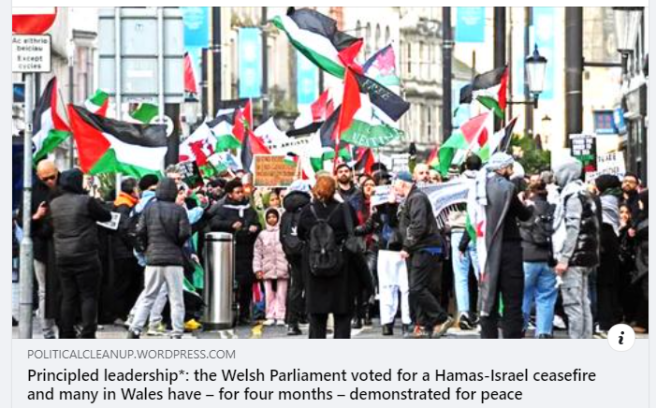
Principled leadership*: the Welsh Parliament voted for a Hamas-Israel ceasefire and many in Wales have – for four months – demonstrated for peace
of
o
Davos man: unmoved by loss of human lives but galvanised by loss of profit
The U.N. world court on Friday called on Israel to “take all measures” to prevent a genocide of the Palestinians. But it stopped short of demanding a ceasefire.
AP press reports that Jan Hoffmann, who heads the trade logistics branch at Geneva-based UN Conference on Trade and Development (UNCTAD), told a video press conference with U.N. reporters that the Houthi attacks are taking place at a time when other major trade routes are under strain.
Since Russia’s invasion of Ukraine and other geopolitical tensions have reshaped oil and grain trade routes including through the Black Sea, Hoffmann said that total transits through the Panama Canal in December were 36% lower than a year ago, and 62% lower than two years ago. Severe drought has dropped water levels in the canal to their lowest point in decades, severely reducing the number and size of vessels that can travel through it.
Ships carry around 80% of the goods in world trade but the Red Sea crisis is causing significant disruptions in the shipment of grains and other key commodities from Europe, Russia and Ukraine, leading to increased costs for consumers and posing serious risks to global food security. Hoffman warned that shipping costs have already surged and energy and food costs are being affected, raising inflation risks.
The Suez Canal handled 12-15 per cent of global trade in 2023, but UNCTAD estimates that the trade volume going through the waterway has dropped by 42% over the last two months.
Since November, the Yemenis have launched at least 34 attacks on shipping through the waterways leading to Egypt’s Suez Canal – a vital route for energy and cargo between Asia and Europe – as they call for a halt to the brutal assault on Palestinians by Israel in Gaza. Major players in the shipping industry have now stopped using the canal.
The largest company, Maersk, chose to continue journeys through the Red Sea and toward the Suez Canal and Operation Prosperity Guardian (OPG) was launched, bringing together the United Kingdom, Bahrain, Canada, France, Italy, Netherlands, Norway, Seychelles and Spain, to address security challenges in the southern Red Sea and the Gulf of Aden.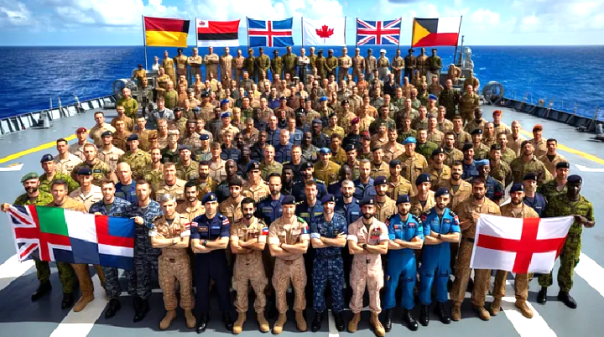 However, since that failed to deter a December 30 attack on another Maersk vessel, the Maersk Hangzhou, Maersk has again diverted all Suez-bound ships around the Cape of Good Hope until further notice. Will vested interests press effectively for peace where others have failed?
However, since that failed to deter a December 30 attack on another Maersk vessel, the Maersk Hangzhou, Maersk has again diverted all Suez-bound ships around the Cape of Good Hope until further notice. Will vested interests press effectively for peace where others have failed?
0
0
0
0
0
0
o
o
o
o
Honouring refusals to fight in America and Israel
Draft-card burning was a symbol of protest performed by thousands of young men in the United States and Australia in the 1960s and early 1970s. The first draft-card burners were Americans participating in the opposition to United States involvement in the Vietnam War.
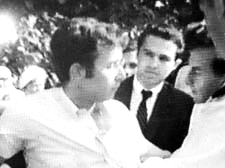 Thousands of GIs rejected their roles and became deserters. One of them was twenty-two-year-old Corporal Mark Shapiro, who had an unblemished service record and good prospects for promotion as a military cryptographer. He refuses to speak about his experiences in Vietnam except for mentioning that he found it hard to stomach talk of “gooks” and “slant-eyed bastards.”
Thousands of GIs rejected their roles and became deserters. One of them was twenty-two-year-old Corporal Mark Shapiro, who had an unblemished service record and good prospects for promotion as a military cryptographer. He refuses to speak about his experiences in Vietnam except for mentioning that he found it hard to stomach talk of “gooks” and “slant-eyed bastards.”
He continued to protest about the tragedy of war. At a US embassy protest in 2007 (left), he said “Vietnam was a great tragedy and . . . My protest is in the memory of the three million Vietnamese killed and the 650,000 Iraqis and the 3,500 US soldiers killed in Iraq.”
A search will reveal indications of declining military morale in the Israeli army. A number of allegations are made here. Haaretz records that Israeli army officials report ‘disturbing’ decline in combat reservists showing up for duty. In one battalion of an elite Brigade, only 57% of reservists who were called for training have reported, while the usual turn-out rate stands at 90%.
Middle East Monitor reports that about half of an Israeli army reserve battalion has reportedly refused to enter the besieged Gaza Strip and fight there, the Hebrew Kan Reshet Bet radio reported on January 17th:
“Reservist fighters who were called to training ahead of the establishment of the Hashomer Brigade (…) have severely criticised the serious gaps in equipment, professionalism, the lack of manpower and especially the fact that in the middle of the training they were informed that they were entering the Gaza Strip without having trained as required.”
This month there have been many reports about the refusal of a young Israeli, Tal Mitnik, to serve in the army. Open Democracy’s article has a video shot in a Tel Aviv studio and a transcript. Extracts:
 “I am refusing because, like I said, I refuse to take part in this revenge war. I’m refusing because I want to make a statement about how we need to conduct ourselves in this land. I feel like there’s too much violence here. There’s too much revenge and talk about this side or that side.
“I am refusing because, like I said, I refuse to take part in this revenge war. I’m refusing because I want to make a statement about how we need to conduct ourselves in this land. I feel like there’s too much violence here. There’s too much revenge and talk about this side or that side.
“In military prison, I got asked a lot, “What do you think? We should just stop the war and put our hands up and not do anything?” And I would answer, “No, we need to keep fighting.
“We need to keep fighting for a just future. We need to stop the physical fighting between us, and we need to very, very aggressively push for a better future.”
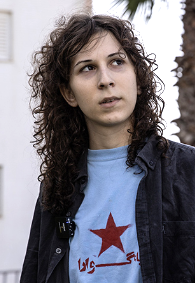 Ella Keidar, who refused to serve in the Israeli army, expressed her belief that everyone has the right to live freely and well: “I don’t want to serve in an army that enforces the occupation, implements a racist regime, and plays a role in oppressing the Palestinian people in this exploitation project,” she said to Middle East Monitor
Ella Keidar, who refused to serve in the Israeli army, expressed her belief that everyone has the right to live freely and well: “I don’t want to serve in an army that enforces the occupation, implements a racist regime, and plays a role in oppressing the Palestinian people in this exploitation project,” she said to Middle East Monitor
She highlighted her belief that the only solution to the Israel-Palestine conflict is political, not military: “Like Israelis, Palestinians also deserve freedom. I believe in the possibility of an equal future, which includes the right of return for Palestinians (to the land from which Israel expelled them)”.
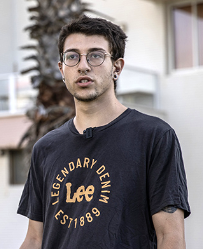 A nineteen-year-old Israeli, Ariel Davidov, explained his reason for refusing to serve in the Israeli military as “not wanting to be a part of immorality and injustice”.
A nineteen-year-old Israeli, Ariel Davidov, explained his reason for refusing to serve in the Israeli military as “not wanting to be a part of immorality and injustice”.
He lives in a neighbourhood near occupied East Jerusalem and has seen Israeli forces using excessive violence against Palestinians in Sheikh Jarrah, Silwan, and Isawiya – neighbourhoods of East Jerusalem. He has also participated in protests against the attempts to Judaize the city. He explained his reason for refusing to serve in the Israeli military as “not wanting to be a part of immorality and injustice”.
As Tal Mitnik said: “(W)e need to talk about how we need to go forward in a future of coexistence, where both Israelis and Palestinians can live together ad live with security and peace”.
o
Only the late, great John Pilger could express the many-facetted horrors of the wars raging now – and only Media Lens could do him justice
Read John Pilger – ‘A Majority Of One’ – on their website.
Extracts
Thoreau observed: ‘Any man more right than his neighbours constitutes a majority of one already.’ (Henry David Thoreau, Walden and Civil Disobedience, Penguin Classics, 1986, p.397)
Raviv Drucker, one of Israel’s leading investigative journalists, commented: ‘In general, the Israeli media is drafted to the main goal of winning the war, or what looks like trying to win the war…‘The shock [of 7 October] was so brutal, and the trauma is so hard that journalists see their role now, or part of their role, to help the state to win the war. And part of it is showing as little as possible from the suffering in Gaza, and minimising criticism about the army.’
This is better termed anti-journalism, a propaganda system censoring even the most crucial facts.
The global dominance of anti-journalism is the correct context in which to evaluate the rare, authentic journalism of John Pilger, who died on 30 December, and the response of the corporate critics smearing him.
Is it difficult to understand that war-winning propagandists deem the trashing of real journalists like Pilger a key part of their role? This week, Declassified UK reported: ‘Recently declassified files show how the UK government covertly monitored Australian journalist John Pilger, and sought to discredit him by encouraging media contacts to attack him in the press.’
Consider that, in 2005, Pilger said of Blair and Iraq: ‘By voting for Blair, you will walk over the corpses of at least 100,000 [ultimately, in excess of one million] people, most of them innocent women and children and the elderly, slaughtered by rapacious forces sent by Blair (New Statesman, 25 April 2005)
https://johnpilger.com/articles/tony-blair-must-be-prosecuted
Naturally, anti-journalism reflexively brands this ‘an extreme left-wing and anti-American bias’ that ‘consistently underscored much of’ Pilger’s reporting, as The Times opined in its obituary. In fact, there is nothing ‘extreme’, ‘anti-American’ or even ‘left-wing’ about opposing the mass killing of civilians for profit.
No wonder a journalist friend working in a major British TV news studio told us: ‘You must see the reaction in a newsroom when one mentions Chomsky or Pilger. They run the other way, and I can see they are afraid by the look on their faces’. (Email to Media Lens, 8 July 2005)
No-one else even came close. Schopenhauer observed: ‘Talent hits a target no-one else can hit; Genius hits a target no-one else can see.’
The 2007 Gandhi Foundation International Peace Award was presented to Media Lens by Denis Halliday – the former United Nations humanitarian coordinator in Iraq. Left: David Edwards and David Cromwell, co-founders and co-editors of Media Lens, right, Denis halliday and John Pilger
That Pilger sent the Media Lens editors one last message of encouragement at a time when he was gravely ill gives an idea of his inexhaustible generosity of spirit. Note, also, the sense of fun and even joie de vivre even in this last message sent at such a difficult time. Pilger’s love of writing, of word play, of supporting other people, came out of a deep love of life.
Pilger was able to make light of the many baseless smears but they sometimes wounded him deeply. He was similarly sensitive to injustices perpetrated against others and against himself; hence his reputation for being ‘prickly’. If he was sometimes prickly, it was because he was sincere, human; because he felt things deeply, painfully. His great triumph was to use this sensitivity, this pain, in the cause of truth in defence of the powerless.
The Media Lens editors ended: “Over the years, through many tests and travails, highs and lows, we developed a habit of ending our emails to each other with the same words. One last time, then, we say with all love and gratitude: Onwards, John!”
“We’d like to express our sincere condolences to John Pilger’s partner, Jane Hill, and to their family. We wish them all the very best”.
0


